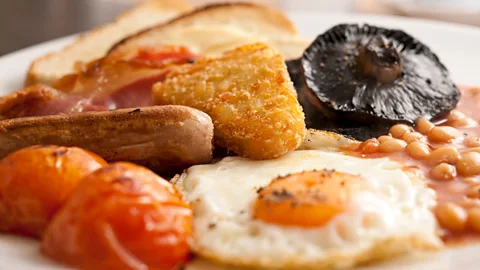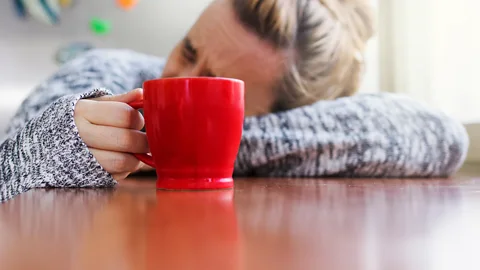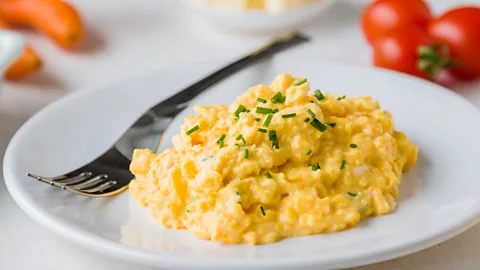No, you can't eat your way out of a hangover
 Getty Images
Getty ImagesFor some it’s a plate of eggs, for others the gut-busting breakfast, for others the humble banana. But can any foods really help take the morning-after pain away?
The hangover has been with us forever, it seems. Several years ago a freshly deciphered Egyptian papyrus revealed that even 1,900 years ago, cures for the after-effects of consuming too much alcohol were on people’s minds – the recommended option in this case being a necklace made out of the leatherleaf plant.
Various other treatments suggested by folklore include a breakfast of pickled herrings, a fried canary (thanks, Romans), salty plums, and the Prairie Oyster, an American concoction consisting of raw eggs, tomato juice, hot sauce, and other fixings. Anything that might cure the pounding headache, nausea, fatigue, and disorientation that characterize the hangover has been tried.
However, very little, other than the tincture of time, seems to work. One difficulty in deg a hangover treatment is that exactly what a hangover is, when it comes down molecular biology, is still not clearly known. Intriguingly, hangover symptoms don’t occur until the alcohol has already left our blood.
You might also like:
That suggests that metabolites made when our bodies break it down may be involved. Ethanol is degraded by liver enzymes into acetaldehyde, and then further broken down into acetate, which turns into fatty acids and water. Some scientists have speculated that acetaldehyde may cause some hangover symptoms, especially given evidence that drunkenness occurs more quickly in people with mutations that hamper the enzymes that remove it. But some studies suggest that acetaldehyde levels don’t correlate with hangover severity.
 Getty Images
Getty ImagesOthers are suspicious not merely of the alcohol itself or its metabolites, but what comes along with them—the substances in drinks that give them their colour and flavour, sometimes called congeners. There is a whole constellation of molecules generated during fermentation in a whiskey, for instance, whose presence may have something to do with how you feel after consuming too much of it.
Darker liquor, with more of these substances, does seem worse than clear: one 2009 study found that those who drank dark bourbon felt much worse than those who drank vodka. But there is quite a bit of variation between people, in everything from basic biology to drinking amount to speed—not to mention age, which many suspect makes it more difficult to get away scot-free from a night of over-indulgence.
Not many studies have carefully ed for all these things, in part because it’s difficult to control everything and still mimic in a natural way the way people behave on a debauched night out.
In truth, the symptoms of a hangover probably don’t come down to a single molecule or set of molecules, but rather a combination of factors. Drinking alcohol does result in a shift in hormone regulation that can cause people to urinate more, so they may be dehydrated the next day, helping to for the headache. People often drink at the expense of getting a full night of sleep, and alcohol impairs the quality of the sleep they do get once they bed down.
The fatigue and confusion may come in part from too little sleep or poor sleep. Some researchers have floated the idea that the fuzzy-headedness and cognitive impairment of the hangover may stem from immune activation of some kind, citing higher levels of certain inflammatory compounds. “There are theories of the alcohol hangover being an immune response to heavy alcohol intake,” says Joris C Verster, a professor at Utrecht University who studies the physiology of hangovers. “Research is currently in progress to examine immune messenger substances such as cytokines.”
The internet abounds with well-meant suggestions about what to eat to help dull the pain. Bananas are sometimes bandied about as hangover helpers, with some suggesting that they can replenish nutrients like potassium lost while drinking. But nutrient deficiency is not likely to be a cause of hangover symptoms, nor are you likely to have such a deficiency after a single night of drinking.
 Getty Images
Getty ImagesHeavy, greasy food – a classic ‘Full English’ or diner breakfast – is sometimes talked about as something that can help. But this seems to be a confused version of the advice to eat heavily before drinking, so that alcohol absorption is slowed; there is no evidence that it helps afterwards.
Some suggest eating eggs, with the justification that they contain an amino acid used in the breakdown of acetaldehyde. This, too, is a bit fanciful as a hangover aid. There is no good evidence that consuming that amino acid (which, incidentally, is contained in other foods as well) helps with symptoms either.
Treating the symptoms with rest, water, and aspirin is likely to be the best treatment for some time to come. Eating a hearty meal beforehand and drinking slowly can help keep the levels of alcohol and other substances your liver and the rest of your body have to deal with at a manageable level throughout the night. But the best way to avoid a hangover is to not drink to excess. If you need something to motivate you, imagine eating a fried canary while reeling from nausea. The only thing worse than the hangover may be the cure.
--
If you liked this story, sign up for the weekly bbc.com features newsletter, called “If You Only Read 6 Things This Week”. A handpicked selection of stories from BBC Future, Culture, Capital, and Travel, delivered to your inbox every Friday.
